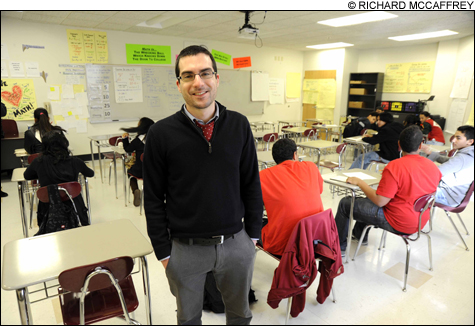
CALM, ANALYTICAL, DRIVEN Brian Swanson, the Teach for America prototype.
|
Just off the main drag in Federal Hill, in a brightly painted office, a series of hand-written notes hang on the wall. This is headquarters for Teach for America Rhode Island, the local branch of a booming nonprofit that recruits top-tier college graduates to teach in some of the nation's toughest public schools.
The state's first class of TFA instructors, required to make two-year commitments to the profession, is small — just 30 teachers spread over a handful of traditional and charter schools in Providence, Newport, Central Falls, and Cumberland.
And most of the notes hanging on the wall — the corps' self-proclaimed short- and long-term goals — reflect the modest, if majestic, hopes of a handful of teachers trying to boost achievement for a few hundred kids. But there, in a longer-term category, is at least one missive pointing to a far larger aim: the transformation of the state's struggling public school system.
Call it the Teach for America paradox: an organization that is, at once, too small to have an impact on more than a small sliver of the nation's disadvantaged students and so potent as to play a central role in the most ambitious school reform effort in memory.
The big education story of the last 20 years is the rise of a sprawling network of self-styled reformers convinced that a market-driven approach to reform — charter schools, data, accountability — can obliterate the yawning achievement gap that has long separated the white and well-to-do from the black, brown, and poor.
It is a movement with plenty of stars — Bill Gates and Barack Obama among them. But somewhere near the center of this network is TFA, which has developed into a bona fide phenomenon on the nation's elite college campuses — a sort of Peace Corps for our time; last year, fully 13 percent of Brown University seniors applied for a job with the organization and the numbers were similar at Harvard and Yale.
The group's pole position owes something to its embodiment of the reform movement's signature ideas: that high-performing teachers — more than smaller class sizes or smaller schools or neatly pressed uniforms — are the single best hope for low-performing students; and that traditional methods of recruiting, training, and evaluating instructors are deeply flawed.
But TFA's influence is also rooted in a determined effort to look beyond the classroom — to shape its network of 20,000 alumni into a potent political force; a mighty collection of elected officials and policy wonks and superintendents deeply affected by their two years in the classroom.
TFA wants to reform education from the bottom-up and from the top-down. And that ambitious effort has landed in Rhode Island — a shot in the arm for the state's own burgeoning reform movement; and a source of no small concern for those who consider the market-driven approach to change an unproven, destructive, and fundamentally arrogant endeavor.
'DOESN'T MEAN I CAN BE A SURGEON'
For Patrick Crowley, the bright and bluntspoken assistant executive director for the National Education Association Rhode Island teachers union, it is Teach for America's central premise that offends.